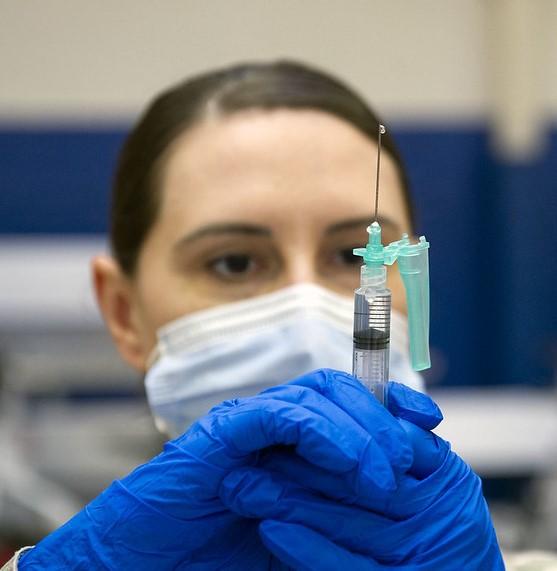Two new studies reveal that although COVID-19 vaccine hesitancy has declined in the United States, 35.2% of adults 18 to 39 years and 8.7% of those 65 and older still said they would not partake as of March 2021 and November 2020, respectively.
Trust rises in Black, Hispanic respondents
UK researchers leading the first study, published yesterday in JAMA, sent online questionnaires to participants in the Understanding America Study every 14 to 28 days from Oct 14, 2020, to Mar 29, 2021.
A total of 7,420 participants completed 42,154 questionnaires that asked how likely they were to receive a COVID-19 vaccine and how much they trusted "the governmental approval process to ensure the COVID-19 vaccine is safe for the public" and "the process in general (not just for COVID-19) to develop safe vaccines for the public."
Estimated vaccine hesitancy dropped 10.8 percentage points, from 46% in October 2020 to 35.2% in March 2021. While substantial declines in hesitancy were seen in all demographic groups, the largest reductions were among Hispanic and Black participants (-15.8 percentage points, from 52.3% to 36.5%; -20.9 percentage points, from 63.9% to 43%).
By March, participants most likely to say they weren't willing to get a vaccine were those aged 18 to 39 (44.1%), without a college degree (42.9%), and living in households with annual incomes of $50,000 or less (43.7%).
Estimated trust in vaccination was low in all demographic groups in October (1.7 to 3.1 on a scale of 0 to 6) but rose significantly by March. Black and Hispanic participants reported the highest increases in trust (0.6 points), along with those who were college educated (0.7 points). The authors noted that the reductions in COVID-19 vaccine hesitancy occurred at the same time as the vaccines were issued emergency use authorizations and rolled out.
The declines in hesitancy among Hispanic and Black participants are important, they said, "because COVID-19 vaccine acceptance has been particularly low among these groups, who have experienced a disproportionate burden of severe illness and death because of COVID-19."
Yet they pointed out that March estimates of vaccine hesitancy were still high, particularly in young adult, Black, and low-income participants. "Further steps are needed to build public trust, extend outreach and educational programs, and increase vaccination opportunities to ensure high levels of vaccination uptake," the researchers concluded.
Variability by race, sex, education, income
The second study, led by Johnson & Johnson researchers and published yesterday in PLOS One, involved 7,402 US adults 65 and older who were enrolled in a clinical study and asked to complete a COVID-19 vaccine assessment via smartphone from Nov 6 to 20, 2020.
Of the participants, 91.3% said they were willing to be vaccinated, with 63.6% indicating that they were very willing and 27.8% indicating they were somewhat willing. On the other end of the spectrum, 6.0% were not very willing, and 2.6% were not willing at all.
Women and Black participants were less willing to be vaccinated than other respondents (odds ratio [OR], 0.49 and 0.24, respectively), with 12.1% of women and 26.8% of Black participants saying they were not very or not at all willing, compared with 5.7% of men and 8.0% of White respondents. More robust vaccine acceptance was linked to higher educational attainment and income.
Overall, 91.4% of women and 88.9% of men said they planned to discuss the vaccine with their healthcare provider before deciding whether to be vaccinated. Of those who indicated their unwillingness to be vaccinated, 66.2% said they would decide after they talked with their healthcare provider.
Vaccine willingness increased after positive results from the Pfizer/BioNTech phase 3 COVID-19 vaccine clinical trial were reported during the study, with hesitancy dropping in those not at all willing (2.8% to 1.4%) and those not very willing (6.3% to 5.9%).
Factors tied to vaccine acceptance in all groups were beliefs that the COVID-19 vaccines, as well as vaccines in general, are safe and effective. The most strongly linked beliefs were that the vaccine would help protect "myself and others" (OR, 38.6), would be safe and effective (OR, 21.6), and that short-term side effects such as pain at the injection site could be tolerated (OR, 10.9).
The researchers, however, said they were concerned that 1 in 11 older, at-risk participants were still reluctant to be vaccinated as of November because pandemic control will rely on broad vaccine uptake. "Variability in vaccine willingness by gender, race, education, and income suggests the potential for uneven vaccine uptake," they wrote. "Education by health providers directed toward assuaging concerns about vaccine safety and efficacy can help improve vaccine accepta














